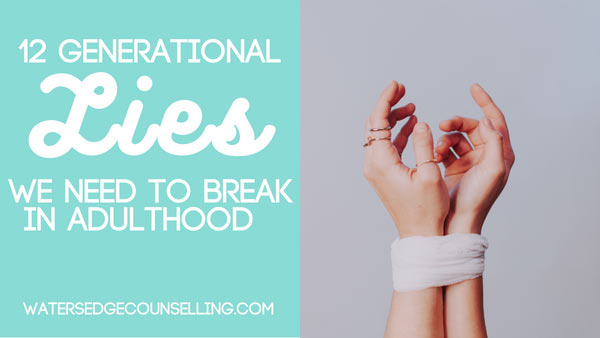
We all grow up believing certain things about the world. It’s more than a preference – these are deep seated beliefs about our worth, our identity, our value and purpose. In turn, these beliefs are the filter through which we view everything else. When these beliefs aren’t true, they are generational lies which take root and are passed down the family line, harming our ability to give and receive love.
These beliefs are instilled in us during our formative years, up to the age of 7. Our brains are developing at a rapid rate, we are building attachments with key people, and we long for safety and comfort over survival. What we experience over these years is a building block to our identity. And often, these beliefs are generational; projected onto us by our parent or parent figures.
In some cases, we develop a belief because someone says it specifically to us. So, if a parent tells a child they are a waste of space, not enough, or a problem, they will likely grow up believing this lie about themselves.
But this also happens in less obvious ways. A child who experiences chronic illness in their early years may develop a belief that they are innately broken or are a problem to their parents. A child who was abandoned or orphaned may grow up believing they are unlovable. These are all lies – but are so deeply engrained in us, that it takes intentional work to uncover and work through them.
When we are aware of our lies, we can heal. Then we learn to challenge the assumptions we hold about ourselves. This can also empower us to be more open, resilient and wise in relationships.
So what generational lies do you believe about yourself? Here are a list of questions about your childhood that will help you find out.
Were you ever seriously sick, have a near death experience, or a traumatic birth?
You might believe lies that say your presence hurts people; that you are a burden; or that you have to strive to be worthy of life.
Did you witness or experience family conflict, abuse or violence?
You may believe that you are the reason people you love get hurt and that you need to protect certain people at all costs. Perhaps you believe that certain stereotypes of people are untrustworthy, or that you can’t trust your instincts. Maybe you think you aren’t worthy of love, or of being treated with respect and kindness.
Were you made to look and act a certain way, or did you see a parent try to meet certain standards of beauty or masculinity?
A parental figures relationship with the mirror will directly impact a child. Statements they make about their weight, age, clothes, makeup and stature are inherited by children who then believe they need to meet these standards themselves. In some cases, a parent will say these to a child overtly such as, “don’t eat that, you will get fat.” Or “you can’t dress like that, boys won’t like you.”
If you wrestle with your body image, disordered eating or perfectionism, ask yourself what example was set for you when you were younger. There is a chance your parent figures were taught these same values by their parents. As adults, we can help children form healthy beliefs about their bodies by championing their talent, smarts, movement and compassion.
Did people die, leave you or betray you?
A child who experiences the loss of a loved one – whether it be through death, life transitions or a family feud, may grow up believing that no one is trustworthy, and everyone will leave them. The idea that it was their fault, or that it is easy to be a loner may be evident in their lives. If this is occurring in your child’s life, talk with them about what is happening and allow them to ask questions. You are helping them to create an honest and healthy narrative that will form a healthy narrative for their future relationships.
Do you want to identify other generational lies you might believe? Recall the events in your childhood that were formative to you, then think about how your everyday interactions with your parents or parental figures made you feel. You will begin to see the patterns of ideas, beliefs and lies that you picked up along the way. That is the first step to break generational lies. The next step is bringing them up with a therapist, so you can learn strategies to break the stronghold of these lies in your life.
Break the generational lies in your life. Contact Colleen on 0434 337 245, Duncan on 0434 331 243 for a FREE 10-minute phone consultation on how we can best help you, or press book now and make an appointment.